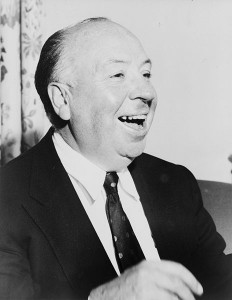For years, I lazily accepted the notion that director Alfred Hitchcock was underrated by the media as merely a purveyor of spine-tingling melodrama, someone thought of as an entertainer of the masses but not an artist. I assumed that the campaigning of his greatest admirer, Francois Truffaut, helped revise the opinion of Hitch as someone worthy of high praise.
There may be some truth to that, but people definitely knew how great Hitchcock was long before the ’60s. Case in point is a 1939 article in Life magazine, “Alfred Hichcock: England’s Biggest and Best Director Goes to Hollywood.” The piece looks at the esteemed English director’s move to California to begin a brilliant second act to his career.
The article was written by Geoffrey T. Hellman, who was best known as a legendary New Yorker writer but also simultaneously served as associate editor at Life for a couple of years in the ’30s. Hellman’s papers are housed at NYU. An excerpt from the colorful piece, which looks at how Hitchcock’s devious need to cause discomfort carried over from the big screen into his personal life:
“In private life, Hitchcock’s astringent outlook enables him to take an enormous, if deadpan, satisfaction in the distress of his friends and acquaintances, especially in situations induced by himself. Although his flair for practical jokes has suffered a setback in Hollywood, where the novelty of his surroundings and the constant sun seem to have cramped his style, he is beginning to feel more at home, and judging from his past record it is only a question of time until he gives Louie B. Mayer the hot foot. He once offered an English property man a pound for the privilege of handcuffing him overnight, and just before snapping on the manacles gave the victim a drink into which he had slipped a strong laxative. Hitchcock has a sense of values and gave the fellow a 100% bonus the following morning because of the unusual humor of the circumstances.”
Tags: Alfred Hitchcock, Francois Truffaut, Geoffrey T. Hellman

